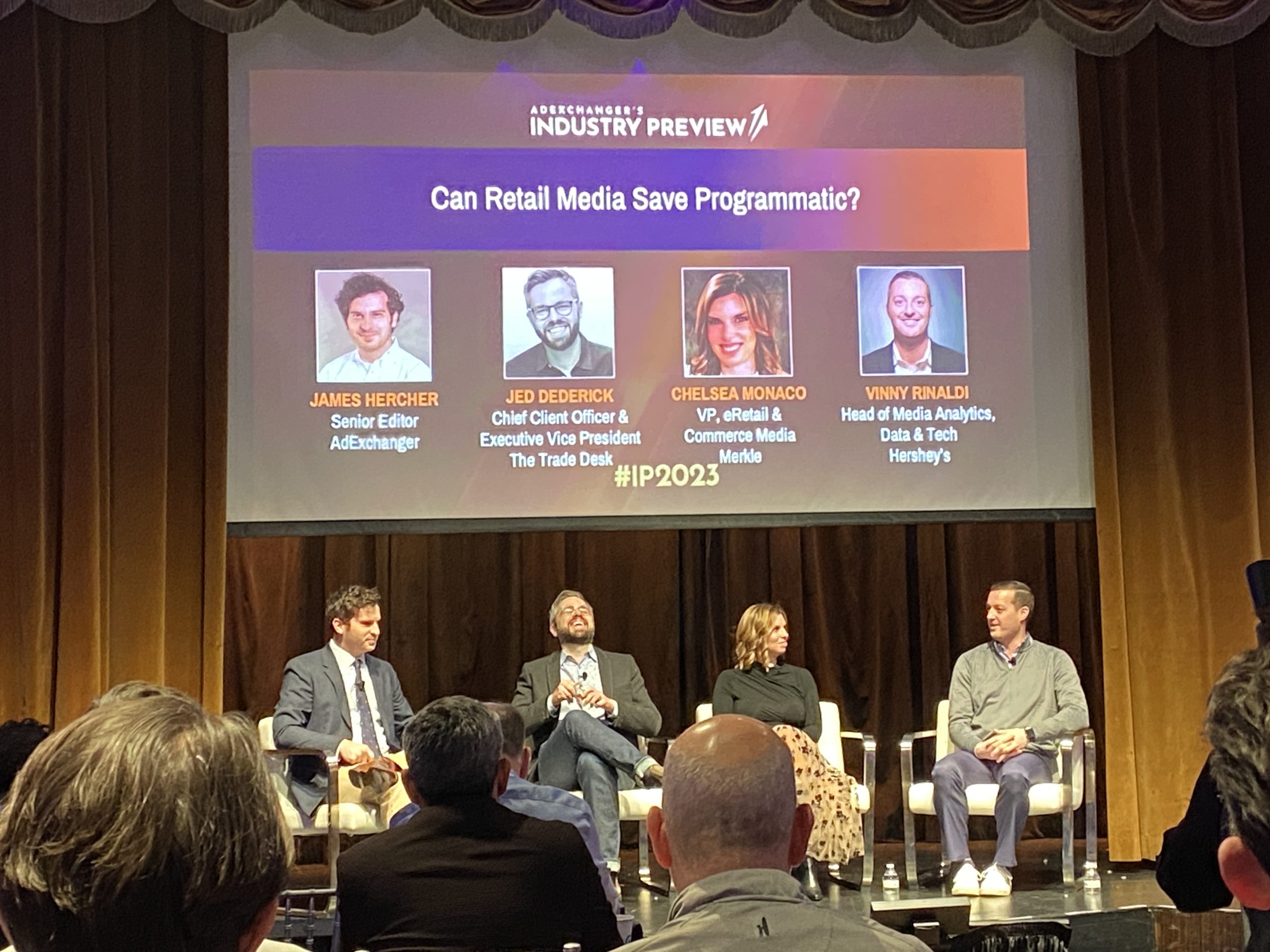
AdExchanger’s yearly kickoff conference features excellent conversations on retail media from the buyer’s perspective on how data privacy and consumer safety are interlinked. Product Marketing Lead Gavin Dunaway shares what stood out.
In the wake of massive industry layoffs and IAB CEO David Cohen’s fiery speech lambasting Apple alongside “privacy extremists,” there was plenty of AdTech gristle to chew on during AdExchanger’s Industry Preview on Feb. 7, 2023. A robust day of content delivered a wide berth of substantive dialog about many of the most pressing topics in the industry, including fresh takes on staid topics such as data privacy.
While I managed to fill up an epic amount of tweets with takeaways from nearly every session (I ran out of gas on the last few), I wanted to zero in on a few topics that I think will play outsized roles in 2023: retail media and… yes, data privacy.
Retail Media Gets Real
A lot of the breathless coverage and conversation around retail media (including mine) has painted it as a glorious development that benefits all parties in digital advertising—or to use my own cliche: a rising tide that lifts all boats. But maybe we haven’t examined enough to understand if buyers are satisfied with the performance coming out of the channel.
That was certainly the message coming out of the admittedly awkwardly titled panel, “Can Retail Media Save Programmatic?” (“I didn’t realize programmatic needed saving,” someone quipped onstage.) Vinny Rinaldi, Head of Media Analytics, Data and Technology at Hershey’s suggested that retail media is pricey, but performance is not remarkably better than other data sets.
Despite plunking down giant budgets (Does a $25 million buy sound like chump change to anyone?), buyers complain they have limited control over the channels where their spend is dispersed. Panelists suggested that too much spend is going to off-property buys, which are not nearly as valuable as placements on retailer properties. (Of course, those on-property placements are highly valuable/expensive because they’re so far down the funnel—higher chance of conversion.) Buying ads off-property reportedly tends to result in higher margins for retailers.
If brand is doing $25M buy with retailer, shouldn’t it decide the dispersion? On-property, off-property, CTV, etc. Some retailers push advertisers offsite because they’re making more margin; but is it bringing in the same level of performance? @adexchanger #IP2023
— Gavin Dunaway (he/him) (@MediaTrustGavin) February 7, 2023
At the same time, measuring performance is a strain on the buy side. Chelsea Monaco, VP of eRetail and Commerce Media at Merkle, noted that the majority of money flowing into retail media is coming from branding budgets, but KPIs like sales ROI are more typical for shopper budgets. Rinaldi has suggested in the past these budgets are merging, so it seems buyer performance measurement must also evolve.
Jed Dederick, EVP and CCO for The Trade Desk, added that retailers did not want to be pigeonholed into shopper budgets (and therefore accountable to direct-response-heavy shopper metrics), and were trying to offer buyers great flexibility to break out of that mold (and also differentiate from retail media’s dominant player, Amazon).
All panelists acknowledged that even though retail media networks were springing up like daisies, it’s relatively early days and there’s little standardization across offerings. Still, table stakes around transparency were emerging—but retailers will need additional transparency around their buyers. Retailers are not just helping and protecting client brands—they’re also protecting their own as well as their core businesses. Ad quality and landing page compliance are of the utmost importance in realizing the rising-tide retail media dream.
Data Privacy Is Consumer Safety
Within the digital advertising industry, we try to frame privacy, data sharing, and tracking in a positive context for consumers—show them how much better digital experiences are when advertising is relevant (“Content is free!”). But “Do consumers understand the value exchange that comes with consenting to data tracking and targeting?” is not the right question, argues UM’s Chief Privacy Officer Arielle Garcia.
What we need to ask is: Are consumers OK with all the risks that come with sharing personal data? Are they willing to roll the dice with their civil/human rights? And we should be asking these questions to the people in the mirror first.
Sure, we can argue (and I have argued) that digital advertisers do not have nefarious intentions—consumers should be more worried about state actors and malware-spreading villains on that front. But sloppy data handling can lead to dire consequences for consumers and brands alike.
3 areas of regs playing out at the same time. ITS THE PERFECT (regulatory) STORM!!! @UMWorldwide @adexchanger #ip2023 pic.twitter.com/GmKpgLLg1m
— Gavin Dunaway (he/him) (@MediaTrustGavin) February 7, 2023
Following Garcia was a highly relevant chat with The Markup Editor-in-Chief Sisi Wei, who detailed the publication’s mission as well as its work in discovering that the Facebook Pixel was sending personal and sensitive data from hospital websites to Meta. No surprise, Meta is now looking down the barrel of a class-action lawsuit claiming HIPAA violations.
“Check your pixels” was the refrain of that session—something we get down with at The Media Trust. So many brands with consumer facing websites and apps—including hospitals, insurance providers, financial companies, etc.—simply don’t understand the data collection activity happening on their digital properties. There’s only a minor amount of shame in that—this is still a relatively new area and several organizations are still figuring out how much data is being collected by whom.
But how can we promise consumers digital trust and safety if we don’t even understand what’s happening on our own properties? We haven’t earned the right to ask consumers to consent to a value exchange when we haven’t ensured their data security, as demonstrated by cases like the GoodRX settlement with the Federal Trade Commission.
We need to realize that data privacy isn’t about gaining consent to free up targetable inventory. It’s about protecting consumers and honoring their rights (and ensuring you don’t run afoul of ever-diversifying regulations!).
Publishers and enterprise brands with consumer-facing properties need help monitoring and managing the various vendor code and trackers running on their websites and apps—to not only make sure that code is serving the brand’s best interests, but also ensure it’s not violating consumer privacy preferences and regulations. Platforms too have to be more careful about the vendors they’re sending off attached to an ad (especially as they can be used as malware-delivering vectors).
We shouldn’t think of privacy as different than anti-trust/regulatory action against anti-competitive behavior; this is all connected. @JamesHercher @adexchanger #IP2023
— Gavin Dunaway (he/him) (@MediaTrustGavin) February 7, 2023
The Conversation Evolves
There was so much great content at AdExchanger’s Industry Preview—effective uses of clean rooms, straight talk on industry layoffs, some controversial financial analyst opinions, a debate on the meaning of “performance media”—that I feel like I’m selling the conference short dialing in on just two topics.
But the event witnessed major conversation shifts on two major topics: retail media and data privacy. Both of these areas are evolving fast—to the benefit of the industry and consumers alike. How is your business addressing these topics?



